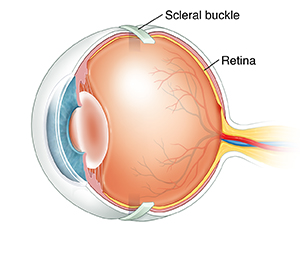Having Scleral Buckling Surgery
Scleral buckling surgery is a type of eye surgery. It’s done to correct a detached retina. It can restore vision.

What to tell your healthcare provider
Tell your healthcare provider about all the medicines you take. This includes over-the-counter medicines such as ibuprofen. It also includes vitamins, herbs, and other supplements. And tell your healthcare provider if you:
-
Have had any recent changes in your health, such as an infection or fever
-
Are sensitive or allergic to any medicines, latex, tape, or anesthesia (local and general)
-
Are pregnant or think you may be pregnant
Tests before your surgery
You may need some exams before your procedure. Your healthcare provider may use special tools to shine a light in your eye and look at your retina. You will need to have your eyes dilated for the eye exam. You also may have an ultrasound of your eye. This helps your healthcare provider look at the detached retina.
Getting ready for your surgery
Talk with your healthcare provider about how to get ready for your procedure. You may need to stop taking some medicines before the procedure, such as blood thinners and aspirin.
Also make sure to:
-
Ask a family member or friend to take you home from the hospital. You can't drive yourself.
-
Follow any directions you are given for not eating or drinking before surgery.
-
You will be asked to sign a consent form that gives your permission to do the procedure. Read the form carefully. Ask questions before you sign if something is not clear.
On the day of your surgery
Talk with your healthcare provider about what to expect during your surgery. The details may vary. Your provider will tell you what to expect during your procedure. A typical procedure goes like this:
-
You may get medicine (anesthesia) to put you to sleep. If this is the case, you will sleep deeply through the surgery. Or you may be awake during the surgery. You will get medicine to help you relax. In this case, your healthcare provider may use eye drops and injections to make sure you don’t feel anything.
-
Your provider will give you eye drops to dilate your eye.
-
The surgeon will make a cut (incision) in the outer layer of your eye.
-
They will use an ophthalmoscope to examine your retina.
-
The surgeon will use a device to treat any tears in your retina, so your retina will seal to the inner wall of your eye around the tears. In most cases, the device uses extreme cold to do this.
-
The surgeon will put a band or "buckle" around the outside of your eye. This helps make sure that your retina stays in place.
-
The surgeon may drain fluid from beneath the retina to make it reattach to the inner wall of your eye.
-
They may put an antibiotic ointment on your eye. This is to help prevent infection.
-
A patch will be put over your eye.
After your surgery
Ask your healthcare provider about what you should expect after your surgery. In most cases, you will be able to go home the same day. Plan to have someone drive you home from the procedure.
Recovering at home
Be sure to follow your healthcare provider’s instructions about eye care. You may need to use eye drops with antibiotics to help prevent infection. Your eye may be sore after the procedure. You should be able to take over-the-counter pain medicine. You may need to wear an eye patch for a day or so.
Your provider may also tell you the following:
-
Don't do any heavy lifting or strenuous exercise.
-
Stay away from dusty or smoky places. These can irritate your eyes.
-
Don't drive until your healthcare provider decides that it is safe for you to do so.
-
Don't get soap in your eyes while showering or washing your face.
-
Limit your time reading to reduce eye strain and eye movements, if your healthcare provider advises.
-
Wear sunglasses to prevent dust or dirt from getting in your eye.
Follow-up care
You will need close follow-up care with your surgeon to see whether the surgery solved the problem. You may have a scheduled appointment the day after the procedure.
When to call your healthcare provider
Call your healthcare provider right away if you have any of these:
-
Eyesight that seems to get worse
-
Eye pain that doesn’t get better or gets worse
-
Eye swelling that gets worse
-
Any new floaters or flashes of light in your field of vision